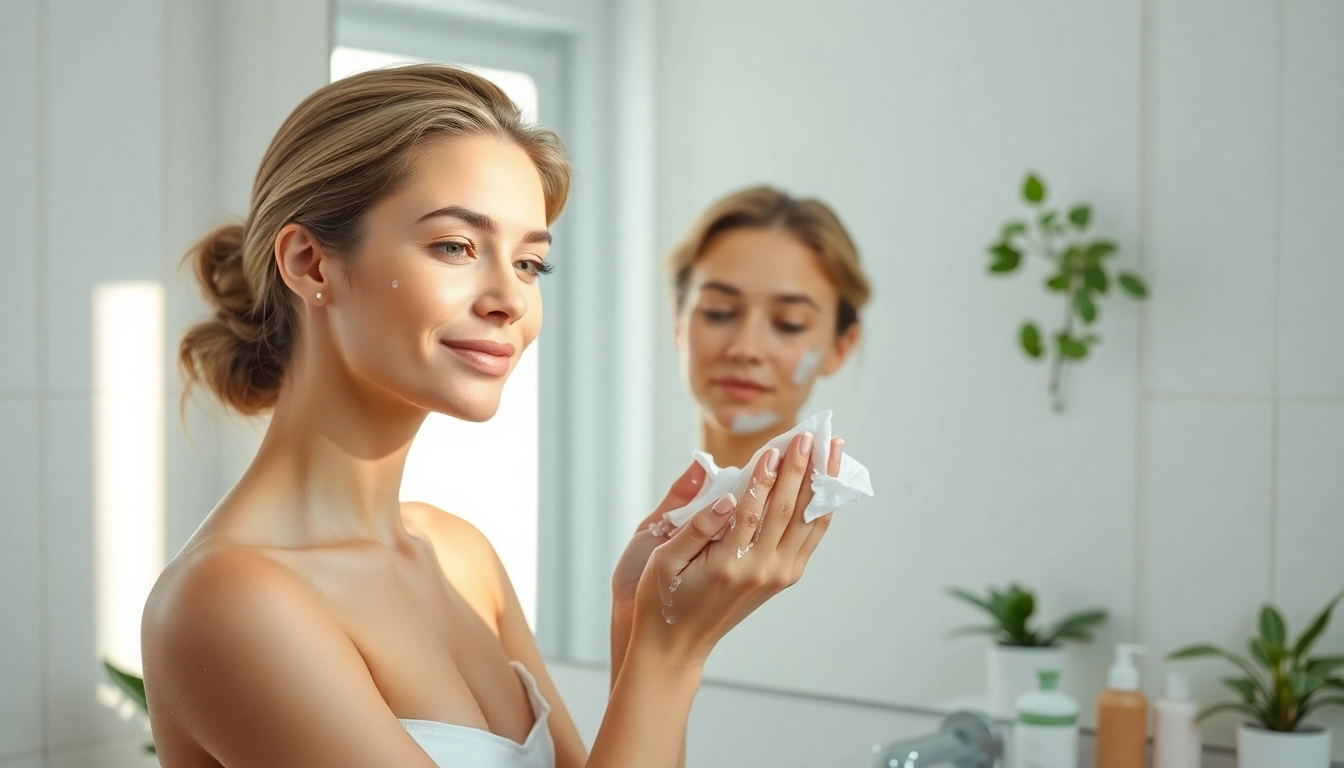Understanding Oily Skin and Its Needs
What is Oily Skin?
Oily skin is a common skin type characterized by excessive oil production from sebaceous glands. This condition can lead to a shiny complexion and contribute to issues such as acne and blocked pores. Those with oily skin may notice that their skin feels greasy or slick throughout the day, particularly in the T-zone, which includes the forehead, nose, and chin. Understanding the characteristics of oily skin is essential in choosing the right skincare routine, particularly a good face wash for oily skin.
Common Causes of Oily Skin
Several factors contribute to oily skin, including hormonal fluctuations, genetics, environmental factors, and diet. Hormonal changes, such as those occurring during puberty, menstrual cycles, or pregnancy, can lead to increased oil production. Genetics also play a significant role; individuals with a family history of oily skin are likely to experience similar issues. Furthermore, environmental factors like humidity and pollution can exacerbate oiliness. Diet also affects skin health, with high sugar and processed foods contributing to increased sebum production.
Identifying the Right Products for Your Skin Type
Choosing the right products for oily skin can be challenging. Look for non-comedogenic formulations that won’t clog pores and consider gel-based cleansers, which can effectively remove excess oil without over-drying the skin. Pay attention to product labels, opting for those that specifically address oily skin concerns. Ingredients like salicylic acid, tea tree oil, and witch hazel are beneficial in controlling oil and acne. Additionally, consult with dermatologists or skincare professionals to identify products tailored for your specific skin needs.
Importance of Choosing the Right Face Wash
How a Good Face Wash for Oily Skin Can Improve Your Routine
A well-formulated face wash is vital to any skincare routine, especially for those with oily skin. Using an appropriate cleanser helps maintain the skin’s balance by effectively removing excess sebum, impurities, and makeup without stripping the skin’s essential moisture. A good face wash can prevent breakouts, reduce shine, and keep the complexion clear and healthy. Incorporating a targeted facial cleanser into your daily regimen can profoundly impact overall skin health and appearance.
Key Ingredients to Look for in Face Washes
When selecting a face wash for oily skin, focus on key ingredients that address oiliness and prevent breakouts. Consider products featuring:
- Salicylic Acid: A beta-hydroxy acid that penetrates pores to exfoliate and clear out excess oil and dead skin cells.
- Tea Tree Oil: A natural antiseptic that helps reduce acne-causing bacteria and soothes inflammation.
- Witch Hazel: A natural astringent that tightens pores and controls oil production.
- Glycolic Acid: An alpha-hydroxy acid that exfoliates dead skin and promotes healthier skin turnover.
- Niacinamide: A form of Vitamin B3 that helps to reduce sebum production and improve skin texture.
Common Mistakes When Selecting Facial Cleansers
Selecting the wrong face wash can lead to a range of issues for oily skin types. Common mistakes include choosing overly harsh cleansers that strip the skin of natural oils, leading to rebound oil production. Another mistake is ignoring product labels; many cleansers marketed for oily skin contain harsh sulfates or irritants that can worsen the condition. Lastly, failing to consider personal skin sensitivities can lead to adverse reactions, exacerbating problems rather than solving them. Always conduct patch tests with new products and consult professionals when in doubt.
Top Recommendations for the Best Face Wash
Popular Drugstore Brands for Oily Skin
There are numerous drugstore brands offering effective solutions for oily skin. Here are some of the top recommendations:
- Neutrogena Oil-Free Acne Wash: This cleanser contains salicylic acid to help treat and prevent breakouts while controlling oil.
- Cleansing Gel by La Roche-Posay: Known for its gentle formula, it balances oily skin without excessive drying.
- Clean & Clear Foaming Facial Cleanser: A budget-friendly option that effectively removes oil and impurities.
- Biore Charcoal Cleanser: Infused with charcoal, it draws out impurities and excess oil from the skin.
Luxury Options Worth the Investment
If you’re willing to invest in skincare, several luxury brands offer high-quality face washes for oily skin:
- Fresh Soy Face Cleanser: A gentle, effective option that balances oily skin while providing hydration.
- SK-II Facial Treatment Cleanser: This luxurious option contains a unique formula that helps improve skin texture.
- Dermalogica Clearing Skin Wash: A professional-grade cleanser designed to reduce breakouts and control oil.
- sunday riley Ceramic Slip Cleanser: A blend of clay and essential oils tailored for oily and combination skin types.
Homemade Face Wash Recipes for Oily Skin
For those who prefer a DIY approach, homemade face washes can be a fun and effective option. Consider trying these recipes:
- Green Tea Cleanser: Brew green tea and mix with a tablespoon of honey and a teaspoon of lemon juice. This combination fights acne and reduces excess oil.
- Cucumber and Aloe Vera Gel Cleanser: Blend half a cucumber with a tablespoon of aloe vera gel. This soothing wash hydrates while controlling oil.
- Foaming Castile Soap Cleanser: Mix a natural castile soap with warm water and add your choice of essential oils like tea tree or lavender. This gentle cleanser helps clear out your pores without harsh chemicals.
How to Properly Use Face Wash for the Best Results
Step-by-Step Guide to Washing Your Face
To achieve the best results from your facial wash, follow these steps:
- Wet your face: Use lukewarm water to prepare your skin.
- Apply cleanser: Use a dime-sized amount of your chosen cleanser and apply it to your fingertips.
- Gentle massage: Using circular motions, massage the cleanser into your skin for 30 seconds, focusing on areas prone to oiliness.
- Rinse thoroughly: Use lukewarm water to rinse off completely, ensuring no product remains on the skin.
- Pat dry: Use a clean towel to lightly pat your face dry. Avoid rubbing, as this can irritate the skin.
Best Practices for Oily Skin Care
In addition to using the right face wash, implement these best practices for oily skin care:
- Moisturize daily: Even oily skin requires hydration. Opt for oil-free moisturizers that won’t clog pores.
- Sun protection: Use a non-comedogenic sunscreen to protect your skin from UV damage.
- Avoid touching your face: Keeping your hands away from your face helps prevent transferring oils and germs.
- Regular exfoliation: Exfoliate 1-2 times a week with gentle scrubs to prevent buildup of dead skin cells.
Frequency of Cleansing: How Often Should You Wash?
People with oily skin should aim to wash their face twice a day – once in the morning and once before bed. This routine helps to remove excess oil and impurities accumulated throughout the day. However, be careful not to over-cleanse, as this can lead to irritation and paradoxically increase oil production. Monitor your skin’s response and adjust the frequency as needed.
Maintaining Overall Skin Health with Cleansing
Other Skincare Routines to Consider
In addition to using an effective face wash, it’s essential to adopt a comprehensive skincare routine. Start by incorporating a toner that balances pH levels and minimizes the appearance of pores. Serums containing active ingredients like niacinamide or salicylic acid can further enhance your routine, targeting concerns specific to oily skin. Follow up with an appropriate moisturizer and sunscreen to maintain hydration and protect against sun damage.
How Diet Affects Oily Skin and Cleansing
Your diet can have a significant impact on your skin’s oil production. Consuming high-sugar and processed foods may exacerbate oiliness and lead to acne. Instead, focus on a diet rich in fruits, vegetables, whole grains, and lean proteins. Foods high in omega-3 fatty acids, such as salmon and walnuts, can help reduce inflammation and promote healthier skin. Staying hydrated by drinking plenty of water is also crucial for maintaining a balanced complexion.
When to Seek Professional Help for Skincare Issues
If you’ve tried various products and routines without success, it may be time to seek help from a skincare professional. Dermatologists can diagnose underlying issues and recommend tailored treatments, which may include prescription medications or specialized procedures. Don’t hesitate to consult a professional if you’re struggling with persistent acne or other skin concerns.




